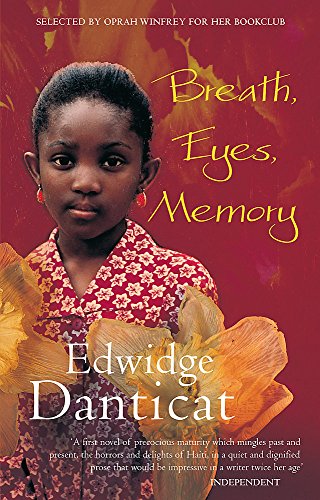Customer Services
Customer Support

Desert Online General Trading LLC
Warehouse # 7, 4th Street, Umm Ramool, Dubai, 30183, Dubai
Copyright © 2025 Desertcart Holdings Limited



Breath, Eyes, Memory
T**S
Haitian Women face their painful history..
Reading this incredible debut novel at university sparked a lifelong interest in the history of Haiti and its people. The republic shares the island of Hispaniola with the Dominican Republic and despite only occupying three eighths of the island, it has a staggering population of 11.4 million making it the most populated island in the Caribbean Sea. However, there is a huge Haitian diaspora with many residents relocating to the USA, probably due to the fact that it has the lowest Human Development Index in the world. The indigenous Taino people seem to have been the original residents of the island, but the first European settlers landed in the 1400’s claiming the island for Spain and it remained part of the Spanish Empire until the 17th Century. The French then laid claim to the most westerly point of the island and they brought the first slaves to Haiti for labour on the sugar plantations planted by the French. It has the incredible honour of being the first island in the Americas to abolish slavery after a successful slave revolt led by Toussaint Louverture and eventually declared sovereignty on Jan 1st 1894 under his successor Dessalines. As the country slowly united there were attempts to declare the whole island as Haiti, but eventually they recognised the Dominican Republic as a separate state. Haiti has been notoriously unstable due to crippling debt owed to France, the dearth of resources left by the French and Spanish, as well as the political volatility. The USA took control of the island in the early twentieth century, until Haitian leader Francois ‘Papa Doc’ Duvalier took power in 1956 and it is this period that is explored in the novel. This period, and the following rule of his son known as ‘Baby Doc’, was characterized by state-sanctioned violence against any political opposition an it’s own civilians, corruption, and economic stagnation. It was only after 1986 that Haiti began attempting to establish a more democratic political system.Danticat’s story is about the women of Haiti, particularly the three generations of Sophie’s family, and how this period of history impacted upon the women of Haiti. Sophie has been brought up by her Tante Atie and this is a beautifully warm relationship that really grounds Sophie in her Haitian identity. They are also incredibly close to her Grandma Ifé who tells Sophie stories passed down orally about people who could carry the sky on their heads. Atie is beautifully conveyed as a loving but slightly abrupt woman, conflicted between the needs created by her own motherlessness and her love for this child who has been left behind. Both Sophie and Atie have a void that each other can fill, but Atie is honour bound not to replace Sophie’s mother and to be sure that her mother’s wishes are carried out. This comes to a head one Mother’s Day when Sophie takes a Mother’s Day card home from school clearly wanting to give it to her aunt, but the women living thousands of miles away who she’s never met. Danticat is very adept at evoking her homeland with recipes and descriptions of mouth watering food. It’s not been a wealthy upbringing, but it is rich in stories, colour, warmth and nourishment. So when Sophie is sent to live with her mother in New York City the contrast is stark and confusing. Whereas Tante Atie seems comfortable in her skin, Sophie’s mother is shown to diet and use skin lightening creams, showing an obvious discomfort about her body and possibly even her identity as a black Haitian woman.Men are largely absent in this novel, but their impact is enormous. Maxine lives in an apartment with her boyfriend and Sophie hears her mother’s nightmares through the wall. Left alone for long periods, Sophie forms a friendship with a male neighbour in the apartment block. This seems to trigger Maxine and the truth of Sophie’s family starts to come to light, as her mother becomes obsessed with protecting her. She begins the horrific practice of ‘testing’ her daughters virginity - something apparently passed down from her own mother - causing shame, confusion and trauma. Sophie learns she is a child of rape and we travel back to the Haiti of Maxine’s teenage years where she is spotted by one of the ‘Tonton Macoutes’ - Papa Doc’s foot soldiers and the bogeymen of every Haitian child’s nightmares. He drags Maxine into the sugar cane field and assaults her. It will take a return to Haiti, for both Sophie and her Mother, to bring about healing. Danticat beautifully portrays inter generational trauma and the oppression of women that’s caused by the patriarchal system, but enacted by women on their daughters. Daughters who were virgins kept their value in the marriage market, just as in other cultures the men want wives who have undergone FGM. It takes rebellion and refusal from the women to create change. Sophie must also face the the ghosts of slavery, represented by the sugar cane her ancestors were brought from Africa to cut. Danticat paints a vivid, colourful but painful picture of a country created by trauma that is still felt many centuries later. She explores how generation must find some way to live, whether by leaving the country of their birth for something starkly different or by staying to face the past and break the chain of hurt each generation has passed on to the next. This is an emotional, evocative and difficult read in parts, but is a beautiful debut from an author whose love of her homeland shines through.
B**L
Great book, off putting pre owned title
This book was sold as "Condition: Used - Very Good." However, if "very good" means that the first 40+ pages are tea/liquid stained and the book looks too disgusting to touch ,then I either need clarification on the phrase "very good" or this is some very wily marketing indeed. I have purchased several pre owned titles before but the condition of this one takes the biscuit! I've since made a 2nd purchase to read and enjoy.
R**N
enjoyedthis book
interesting to read and well writtenabout the lives of women in Haiti, I shall look for more books by this author
G**D
Five Stars
A memoir of a Haitian girl living in Haiti and New York City, torn between two worlds.
C**S
Five Stars
Fabulous writing from one of the Caribbean's best writers.
K**Y
Insightful read!
It's a good read and I love it because it speaks of real life people! It can be a bit sad at times but let's face it; we still need to make sure people are aware of third countries and their issues with women rights!
A**K
Issues between mothers and daughters
Heart-rending debut novel from 1994 by Haitian-American Edwidge Danticat (ED; 1969) about problems of adolescent Haitian girls passed on from mother to daughter for generations. Haitian mothers are described as being as protective about their daughters' virginity as in their ancestral West Africa and they inspect, test their daughters regularly. And women in Haiti often head families, as in the parts of Africa where their ancestors were captured centuries ago, traded and shipped, and are often the principal breadwinners.When Sophie moves from her aunt Atie to her mother in New York at the age of 12, the novel truly begins. What happened before is intriguing and well described: many emotional and traumatic events had already occurred in the lives of Sophie, her aunt Atie, her mother Martine now living in New York, and her grandma in Haïti, before her departure. A very spiritual book full of dreams and images that cross oceans and go back centuries. What follows in New York is captivating. I say no more.Fine novel about girls and their mothers caught between old traditions and different cultures and living environments. Since this novel ED has published several highly-acclaimed novels and collections of short stories.
Trustpilot
2 weeks ago
2 weeks ago